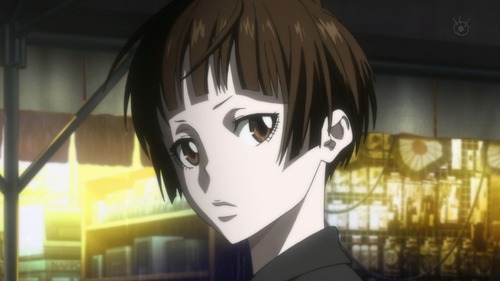Continue reading
Gen Urobuchi, lest you forget where he got the nickname “Urobutcher,”
established his name as an anime screenwriter by grinding a cast of
largely innocent teenage girls into despair between the cogs of a cruel,
unfeeling magical world. Ultimately, Madoka’s title character found a
way to destroy that system once and for all, but the deus ex machina
nature of the resolution never sat well with me. Madoka’s wish may have
been born out of the suffering that she had watched her friends endure,
but it also pointed to a lack of imagination on the part of everyone
that had contracted before her. The fact that there was nothing keeping
another prospective magical girl from making the same wish that Madoka
had essentially cheapened the hardship that the characters underwent
throughout the series, reducing it to nothing more than emotional window
dressing.
Urobuchi’s latest work on Psycho-Pass is by no means flawless, but it
does at the very least avoid repeating this mistake of Madoka’s. At
first glance, in fact, it seems to commit the opposite error: The Sibyl
System that runs Psycho-Pass’ conception of 22nd-century Japan is
quite literally built on criminal minds, and yet the series ends with
its main characters trying to keep it from being overthrown. The
important difference? The Sibyl System, for all its obvious faults, is
also more or less the only thing keeping social order, whereas
Madoka’s system of magic had no obvious upsides. This nuance gives the
internal conflict of Psycho-Pass’ main character, Akane, necessary
weight – she knows on the one hand that Sibyl’s micromanagement of
citizens’ lives is untenable, but at the same time knows that those
selfsame lives would likely be forfeit should it be allowed to fall.
Instead of Madoka’s revolutionary ending, then, Psycho-Pass gives us
an evolutionary one; as Akane puts it, standing in Sibyl’s central
chamber in the final episode, “We’re always aiming for a better society.
One day, someone will come to this room to turn off the power. We will
find a new path. You can count on it,” and indeed Akane’s progression as
a character over the course of the series shows that perhaps she’s ready
to do just that. Psycho-Pass recognizes that dystopia cannot simply be
waved away, and it is for this reason that its conclusion, understated
as it is, sits better with me than Madoka’s finale ever did.

